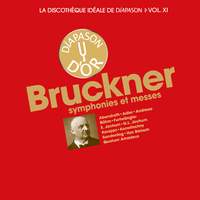.
... jayne - glad you have been enjoying the Adler 6th. The discothèque idéale de Diapason 14 CD box devoted to Bruckner is an interesting and useful collection - it has for the symphonies :
1 (1868, ed Haas 1935) Georg Ludwig Jochum / RIAS 1956
2 (1877, ed Haas 1938) Franz Konwitschny / Berliner Rundfunk SO 1951
3 (1888/89, ed Raettig 1890) Kurt Sanderling / Gewandhaus Leipzig 1963
4 (1881, ed Haas 1936) Hermann Abendroth / Rundfunk SO Leipzig 1949
5 (1878, ed Haas 1935) Hermann Abendroth / Rundfunk SO Leipzig 1949
5 (1878, ed Nowak 1951) Eugen Jochum / Bayerischen Rundfunk SO 1958
6 (revised Hynais, ed Doblinger 1899) F Charles Adler / Wiener Symphoniker 1952
7 (1885, ed Gutmann 1885) Eugen Jochum / Berliner Philharmoniker 1952
7 (1885, ed Gutmann 1885) Karl Bohm / Wiener Philharmoniker 1943
8 (Furtwangler version after Haas) Wilhelm Furtwangler / Wiener Philharmoniker 1944
9 (1894, ed Orel 1932) Wilhelm Furtwangler / Berliner Philharmoniker 1944
9 (1894, ed Nowak 1951) Eduard Van Beinum / Concertgebouw 1956
.
... jayne - glad you have been enjoying the Adler 6th. The discothèque idéale de Diapason 14 CD box devoted to Bruckner is an interesting and useful collection - it has for the symphonies :
1 (1868, ed Haas 1935) Georg Ludwig Jochum / RIAS 1956
2 (1877, ed Haas 1938) Franz Konwitschny / Berliner Rundfunk SO 1951
3 (1888/89, ed Raettig 1890) Kurt Sanderling / Gewandhaus Leipzig 1963
4 (1881, ed Haas 1936) Hermann Abendroth / Rundfunk SO Leipzig 1949
5 (1878, ed Haas 1935) Hermann Abendroth / Rundfunk SO Leipzig 1949
5 (1878, ed Nowak 1951) Eugen Jochum / Bayerischen Rundfunk SO 1958
6 (revised Hynais, ed Doblinger 1899) F Charles Adler / Wiener Symphoniker 1952
7 (1885, ed Gutmann 1885) Eugen Jochum / Berliner Philharmoniker 1952
7 (1885, ed Gutmann 1885) Karl Bohm / Wiener Philharmoniker 1943
8 (Furtwangler version after Haas) Wilhelm Furtwangler / Wiener Philharmoniker 1944
9 (1894, ed Orel 1932) Wilhelm Furtwangler / Berliner Philharmoniker 1944
9 (1894, ed Nowak 1951) Eduard Van Beinum / Concertgebouw 1956
.



Comment